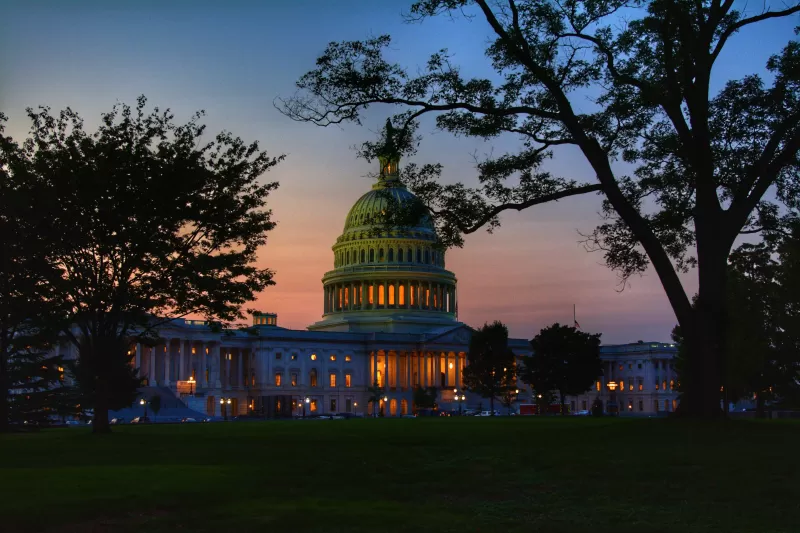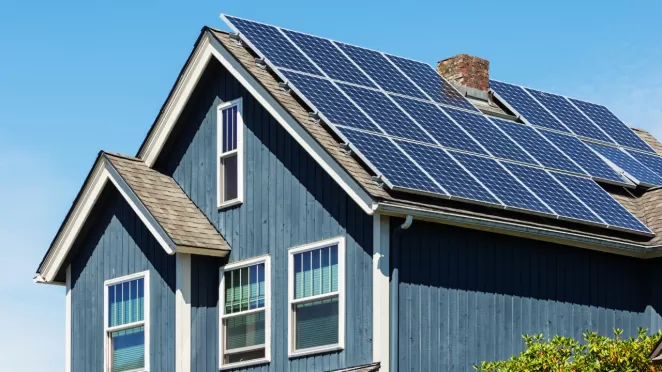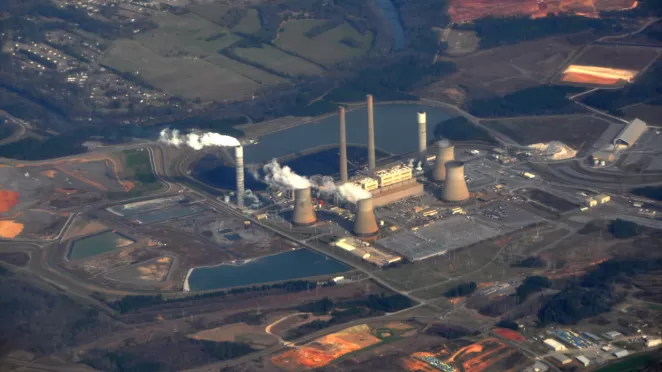“We’re Not Going Backward": Leaders Across America Reject Congress’s Clean Energy Rollbacks

Congress has now passed a sweeping reconciliation bill that would gut key clean energy investments and undo hard-fought climate progress, and leaders from across the America Is All In coalition are speaking out. From governors and mayors to business leaders to public health experts, these leaders warn that the bill threatens to derail job creation, stall clean manufacturing momentum, and raise energy costs for American families. In the face of this backwards and damaging budget bill, voices from across the coalition are united in calling for continued investment in the affordable, reliable, and job-creating clean energy future the country has already begun to build. Below, we share their voices.
America Is All In Co-Chairs, California Governor Gavin Newsom, Illinois Governor JB Pritzker, Cleveland Mayor Justin M. Bibb, and Gina McCarthy, the first White House National Climate Advisor and former EPA Administrator
“Congress is taking a hammer to American ingenuity and our economy, killing jobs, and harming our health and wellbeing. With deliberate policies that raise energy costs, Congress is turning its back on American workers and businesses who work tirelessly to deliver good-paying jobs, lower energy bills, and lead the global clean energy race. Republican Senators are fully denying the reality that clean energy is good for working people, businesses, and the strength and security of our economy.
“As temperatures hit record highs and energy demand projections surge 35-50% by 2040, we need more affordable, reliable, and clean energy quickly. State and local leaders will keep working for the American people, not special interests, by doubling down on efforts to fix our country’s affordability crisis, create clean, abundant energy and good-paying jobs, and cut toxic pollution poisoning our communities. We are not burying our heads in the sand and remain committed to building a clean energy economy that works for everyone.”
“Today, Congress betrayed its promise to the hardworking people of this country by passing a bill that guts clean energy tax credits, raising costs for families and businesses at a time when more than half of Americans are living paycheck to paycheck. Creating more affordable cities that don’t price out the people who built them means investing in the tools and programs that we know lower costs - and that includes clean energy. We have seen firsthand these tax credits have made energy more reliable, more affordable, and more abundant; it has revived American manufacturing and created tens of thousands of good-paying jobs right here in our cities. By gutting clean energy tax credits, Congress is threatening to take us backwards instead of looking towards our future. As portions of our country suffer through yet another record-breaking and dangerous heat-wave, we will not let our cities be pawns of special interests. We will keep fighting the cost of living crisis that has been exacerbated by climate change.
“As mayors, we have the power and the authority to keep pushing forward on the programs and policies that will create more affordable, more prosperous, and healthier cities. Climate Mayors stand ready and able to partner with other state, local, and business leaders to unleash abundant, affordable, and clean energy, create more good-paying jobs, and build healthier, safer, and more prosperous cities nationwide.”
“This bill is a senseless, shameless attack on our future and the very industries and jobs we need to succeed. It makes our country less affordable, less energy independent, less competitive, and less secure at a time when climate impacts are spreading, energy demand is soaring, and costs are already too high. We refuse to follow Congress off this cliff. The America we know embraces new technologies, cleaner air and energy, lower costs, and better health — and that’s exactly what the Alliance’s governors will keep fighting for.”
Zach Friedman, senior director of federal policy, Ceres
“President Trump won office by prioritizing affordable electricity and the restoration of U.S. manufacturing jobs that have been lost to China and other countries. Unfortunately, the legislation he signed today will make those very goals harder to achieve. Cutting clean energy and advanced manufacturing tax credits will make it more expensive to deploy the quickest-to-build and most rapidly growing sources of power at a time when energy demand is rising, making it all but impossible to reduce electricity costs. It will threaten to shutter factories where hard-working Americans are building the key technologies of today and tomorrow. And, as a result, it will put the U.S. in a worse position to compete with China and other countries in AI, advanced manufacturing, autos, and other global industries that will command the 21st century.
“While this bill is disappointing, it could have been much worse if not for the tireless advocacy of the businesses that championed the clear economic case for maintaining clean economy tax credits. Since the 2022 extension and expansion of the credits, the private sector has invested hundreds of billions of private-sector dollars in clean energy and automotive supply chains, manufacturing, and deployment in every corner of the country, particularly in states and districts represented by Republicans in Congress.
“Despite some last-minute improvements made by the Senate, Ceres remains concerned that the bill’s overly complex and counterproductive foreign sourcing restrictions will add unnecessary red tape and uncertainty. The abrupt termination of key incentives will drive up transportation and energy costs, disrupt domestic supply chain investment, and eliminate good-paying jobs in sectors like batteries, steel, critical minerals, autos, HVAC, and solar.
“As the executive branch implements this legislation, it must uphold the full intent, spirit, and letter of the law. Any uncertainty or delays will freeze investment, directly undermining President Trump’s own goals of creating manufacturing jobs, reducing prices, and outpacing China in the race for industrial leadership.
Ceres remains committed to working with companies, investors, the Trump administration, and the current and future Congresses to build a policy environment that invests in American energy, jobs, and competitiveness.”
Lisa Jacobson, President of the Business Council for Sustainable Energy (BCSE) and Lynn Abramson, President of the Clean Energy Business Network (CEBN)
“Compared to earlier proposals, the final legislation provides a more workable transition for some energy businesses currently utilizing federal energy tax credits. However, it imposes many rapid changes to various energy credits that will cause uncertainty and increase energy costs. These provisions include consumer credits for energy efficiency and clean energy that help lower energy costs for families and businesses, make the grid more resilient, protect good American jobs, and provide certainty for vital investments in the energy sector.
“As our country faces skyrocketing energy demand, we need every electron from a broad portfolio of energy sources to keep the lights on for homes and businesses,” Jacobson added. “Instead of encouraging industry growth, this legislation holds American energy businesses back. As we move forward, the data is clear: deployment of a broad portfolio of energy efficiency and clean energy technologies is hard-wired into the U.S. economy. Our coalition will continue to advocate for policies that support a diverse set of energy options in the United States and ensure access to affordable, secure, reliable, and clean energy solutions.”
“We are grateful to the many bipartisan champions who rallied to defend the energy tax credits as the ‘One, Big, Beautiful Bill’ proceeded through consideration these past few months. While their efforts prevented an even more detrimental outcome, taken as a whole, this bill will be a major step backwards on energy security, prices, and jobs in communities across the country.
“The final legislation leaves some energy industries relatively unscathed, but rapidly eliminates credits for efficiency, residential solar, and electric vehicles with no room for businesses to pivot – and abruptly phases out wind and solar at a time of rising energy demand. We appreciate one particularly bright spot: the full and permanent restoration of the R&D tax deduction with retroactive tax relief for small businesses."
Gary Cohen, co-founder and president of Health Care Without Harm
“Health Care Without Harm is deeply alarmed that the U.S. Senate has passed its version of the budget reconciliation bill – reckless legislation that will go down as the most destructive environmental and health bill in U.S. history. This short-sighted policy rolls back important clean energy tax credits, which have already saved hospitals and health systems $154 million over the past two years.
The Senate bill undermines sustainability efforts across the health sector precisely when we need them most. Health Care Without Harm’s analysis shows 91 hospital and health care projects across 34 states are currently using or were planning to use these energy tax credits. Without them, many of these projects face cancellation – threatening the financial viability of projects that could deliver similar savings nationwide. For rural hospitals already operating on reduced budgets, these cuts could mean the difference between keeping doors open or permanent closure – leaving entire communities without access to critical care.
By stripping support for clean, American-made energy, this bill will make the energy grid less reliable, impacting health care facilities' ability to operate and provide care, just as extreme weather is also increasing in frequency and severity, with 100 million Americans currently under an extreme heat threat. It will harm our air and water and put our health at risk through higher local air pollution, and will contribute to hundreds of premature deaths and more cases of asthma and cancer, particularly among children and seniors, and in low-income communities, communities of color, and other marginalized communities that are disproportionately impacted. These health impacts will be exacerbated by cuts to Medicaid and the Affordable Care Act as more than 17 million people lose their health care coverage. This will increase uncompensated care, lead rural hospitals to close, destabilize our nation’s health care system, and increase health care costs for all. We urge the U.S. House of Representatives to reject this incredibly harmful bill.
"Our health and our ability to thrive – as individuals, families, communities, and as a country – is in danger because of the increasing instability of our climate. More than any other industry, health care is seeing the impacts of this crisis on public health. While this bill represents a dangerous step backward, our commitment to environmental health extends far beyond any single piece of legislation. We remain dedicated to mobilizing health care climate action locally, nationally, and globally. We will continue scaling health sector emissions reduction solutions, expanding health care's leadership in building climate-resilient communities, and working to restore the critical infrastructure this legislation seeks to dismantle."
"Yesterday, the Senate decided to make it much more difficult for America to continue its leading role in driving innovative energy solutions, and for higher education institutions to both implement and benefit from the policies that encouraged this innovation.
Higher education has been at the vanguard of shaping new solutions through its research and discovery, serving as the foundation for new industries to form, new jobs to be created, and new workforces to emerge. While the energy sector is just one area where our sector leads these transitions, it is a critical one that many of our community members benefit from. This recent Senate action stifles our sector’s ability to serve this key societal need.
Additionally, the higher education sector has had a long-standing commitment to practice what it teaches, putting energy solutions in the ground as part of campus operations that allow for living and learning labs to train our country’s students in the latest technologies and emergent industries. The clean energy tax credits and provisions for higher education institutions to directly benefit from these credits have catalyzed hundreds of projects at colleges and universities across the country, resulting in investments and jobs in their local communities, from Athens, Ohio, to Charlotte, North Carolina.
Second Nature leads a network of over 400 higher education institutions, and we steadfastly stand with the organizations and coalitions that are urging House members to respond to the Senate’s action with smarter energy policies that will benefit all sectors in the economy."
Dr. David Widawsky, Director, WRI US
“H.R.1. will undercut the Administration’s stated goal of ‘unleashing American energy’ and sends a chilling signal to families, businesses and investors alike. Abruptly phasing out clean energy tax credits will raise costs, slow innovation and jeopardize America’s energy security.
“Electricity demand is growing everywhere—and growing fast. The clean energy cuts in this bill will increase costs and constrain supply at a time when demand for electricity is surging. Working families, business owners and local governments will bear the brunt through higher electricity bills, fewer jobs, and reduced energy resilience to extreme weather. Billions of dollars of investment in infrastructure, manufacturing, energy savings will be lost; failure to keep pace with growing energy demand will make brownouts and blackouts more likely; air will become less breathable; and American economic growth will be at risk.
“Fossil fuels alone won’t meet the skyrocketing energy demand from manufacturing, AI, electrification, and increasingly frequent and intense heat waves that prompt more AC usage. But America can create a more flexible, agile, and resilient power system with renewables and grid upgrades. Clean energy sources are better positioned to come online quickly to meet growing electricity needs and spur economic growth. That’s exactly what companies, state and local governments, utilities and families have been counting on, planning for and investing in.
“Many Americans remain committed to a clean energy future—and we expect to see progress from the cities, states and businesses that have become labs for innovation in recent years. While this bill throws up many roadblocks to progress, these innovators can and must continue driving the country’s energy economy forward. Opportunities remain for them to do so through coalition building, providing innovative financing and policy solutions, and facilitating infrastructure development for critical projects that serve their communities.
"We simply can’t afford to double down on outdated energy sources and policies. Despite this setback, we are not going to give up the race for the secure, affordable and innovative power system that Americans need – and deserve.”
Jonathan Klein and Sara Ross, Co-Founders, UndauntedK12
"As the President signs the federal budget reconciliation bill today, we are thinking about the millions of families across the country who will lose healthcare, face food insecurity, experience rising energy costs, and especially about our nation’s young people.
We think about young leaders from Duluth, Durham, El Paso, Lowell, Oakland, Salt Lake City, Tucson, and rural Colorado—those who’ve led campaigns for clean buses, safe and solar-powered school buildings, and climate education. We think about the courage, clarity, and urgency they bring to this moment. And we feel what so many young people may be feeling now: anger, frustration, and deep disappointment.
The budget reconciliation bill passed by Republicans in Congress and championed by the President is a harmful step backward. It pulls support for clean energy investments that have helped schools cut pollution, lower energy costs, and protect student health. These rollbacks make it harder for districts to modernize aging infrastructure and prioritize scarce resources for teaching and learning—and they slow the broader transition to a clean energy economy.
We regret and reject this choice. It endangers our children’s future. It jeopardizes clean air and clean water. It undermines young people’s right to learn in safe, healthy, climate-ready schools.
We are not giving up. We write today with resolve and a deep sense of responsibility.
At UndauntedK12, we will continue helping schools access every available incentive and funding stream to modernize and electrify their infrastructure. We will support district leaders, educators, and students in organizing for strong state and local policies. And we will fight for schools to be models of sustainability, equity, and resilience—no matter what happens in Washington.
Young people are speaking up at school board meetings, organizing climate strikes, launching sustainability campaigns, and demanding action from those in power. Their voice and vision are shaping a different future—and they are not alone.
We remain undaunted in our belief that every student deserves a school powered by clean energy, to breathe air free from pollution, and to be equipped for the future they will inherit.
Young people: We stand with you, learn from you, and will keep fighting alongside you."

Latest
More articles >
